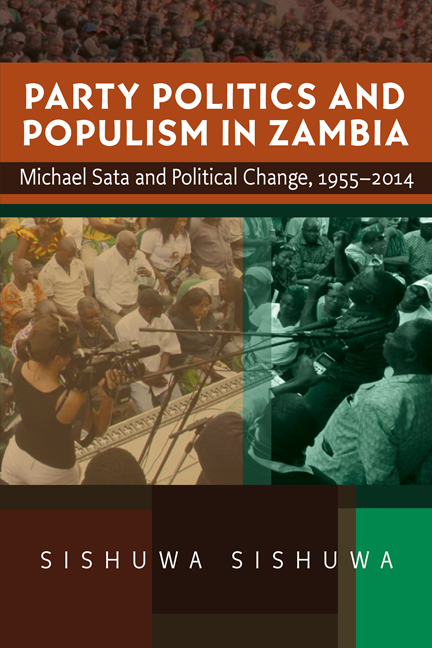Book contents
- Frontmatter
- Dedication
- Contents
- List of illustrations
- Preface
- List of abbreviations
- Map
- Introduction
- 1 Becoming Bemba and a ‘Man of Action’
- 2 Mobilising Urbanites in the One-party State
- 3 Constructing a Power Base in a Dominant Ruling Party
- 4 Building an Alternative Political Force
- 5 Winning the Prize
- Conclusion
- Bibliography
- Index
3 - Constructing a Power Base in a Dominant Ruling Party
Published online by Cambridge University Press: 09 May 2024
- Frontmatter
- Dedication
- Contents
- List of illustrations
- Preface
- List of abbreviations
- Map
- Introduction
- 1 Becoming Bemba and a ‘Man of Action’
- 2 Mobilising Urbanites in the One-party State
- 3 Constructing a Power Base in a Dominant Ruling Party
- 4 Building an Alternative Political Force
- 5 Winning the Prize
- Conclusion
- Bibliography
- Index
Summary
THE CLOSING decade of the twentieth century in Zambian politics was dominated by the Movement for Multiparty Democracy (MMD) and President Chiluba, who rose to power in November 1991 after defeating incumbent President Kaunda and his United National Independence Party (UNIP) – the nationalist movement that had ruled Zambia since independence in 1964. Chiluba secured 76 per cent of the presidential vote in 1991 and about 69 per cent five years later. Against its 1991 total of 125 of the 150 seats in parliament, the MMD increased its parliamentary representation to 131 seats in 1996. Over the course of his decade-long rule, Chiluba embarked on a drive to liberalise the economy and consolidate the democratic space that had permitted his party to gain power.
When the MMD ascended to power, it inherited an economy on the verge of collapse. Widespread shortages of essential commodities, skyrocketing inflation, swelling debt, a highly volatile local currency and a bloated civil service – long used by Kaunda as a patronage political machine – all required an urgent economic recovery programme. With copper exports, on which Zambia's gross national product overly depends, at an all-time low due to the declining price of the commodity on the international market, the MMD had little choice but to turn to multilateral institutions such as the International Monetary Fund (IMF) and World Bank for help. However, donors, who had suspended all financial assistance to Zambia just before the 1991 elections, demanded the implementation of a package of economic structural adjustment reforms as a precondition for the resumption of aid.
Starting early in 1992, Chiluba's government embarked on a decade-long radical economic liberalisation programme partly in response to donor prescriptions, but also as a way of fulfilling the MMD's own pre-election campaign promises. The reformist drive resulted in the privatisation of about 250 state-owned industries, the removal of trade barriers, the liberalisation of financial markets and agricultural marketing, and the reduction of state support of education and health. By the end of Chiluba's first term in office, most of these reforms had been fully implemented. For instance, foreign exchange and price controls had been abolished, all tariffs for trade and imports had been removed, state support for agriculture had been substantially reduced, and user fees for education and health introduced.
- Type
- Chapter
- Information
- Party Politics and Populism in ZambiaMichael Sata and Political Change, 1955 - 2014, pp. 93 - 134Publisher: Boydell & BrewerPrint publication year: 2024



